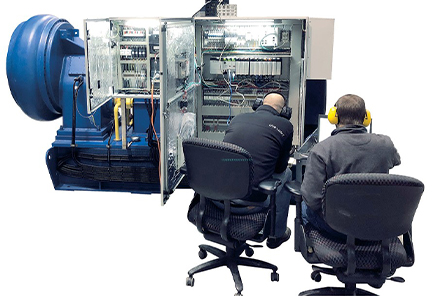Technology has always played a crucial role in shaping the future. From the invention of the wheel to the development of the internet, each breakthrough has propelled humanity forward in countless ways. One of the most exciting advancements of our time is the integration of control technology into various aspects of our lives. Whether it's in our homes, businesses, or even cities, the power of integrated control technology is unlocking new possibilities and revolutionizing the way we live.
Integrated control technology refers to the merging of different systems and devices into a centralized control system. It allows for seamless communication and coordination between various components, creating a synergistic effect that enhances efficiency and functionality. This technology has the potential to transform the way we interact with our environment, making it smarter, safer, and more sustainable.
Smart Homes
One area where integrated control technology is making a significant impact is in the realm of smart homes. With the use of Internet of Things (IoT) devices, homeowners can now control and automate various aspects of their living spaces. From lighting and temperature control to home security systems, integrated control technology allows for seamless integration and management of these systems through a single interface.
Imagine being able to adjust the temperature of your home, turn off the lights, and lock the doors, all with a simple voice command or a click on your smartphone. Integrated control technology enables this level of convenience and customization, making our homes more comfortable and energy-efficient.
Efficient Businesses
The benefits of integrated control technology extend beyond our homes and into the business world. In industries such as manufacturing, logistics, and healthcare, the ability to monitor and control various processes and systems in real-time is crucial for efficiency and productivity.
By integrating control systems, businesses can streamline their operations, automate repetitive tasks, and minimize human error. For example, in a manufacturing facility, integrated control technology can enable a centralized system that monitors and adjusts production line parameters, ensuring optimal performance and reducing downtime.
Moreover, integrated control technology can also provide valuable insights and data analytics, allowing businesses to make informed decisions and optimize their processes further. It empowers organizations to achieve greater operational efficiency, reduce costs, and deliver superior products and services to their customers.
Smart Cities
In the context of urban development, integrated control technology has the potential to transform cities into smart, sustainable, and livable spaces. By connecting various municipal systems, such as transportation, energy, and waste management, cities can become more efficient and responsive to the needs of their residents.
For instance, integrated control technology can enable real-time monitoring of traffic flow, allowing for more efficient traffic management and reducing congestion. It can also facilitate the optimization of energy usage, by automatically adjusting lighting and heating systems in public spaces based on occupancy and weather conditions.
Furthermore, integrated control technology can enhance safety and security in cities. By integrating surveillance systems, emergency response systems, and communication networks, authorities can respond more effectively to emergencies and ensure the well-being of their residents.
Conclusion
Integrated control technology is unlocking a future where our homes are smarter, businesses are more efficient, and cities are sustainable and responsive. By merging different systems and devices into a centralized control system, we can harness the power of technology to transform the way we live, work, and interact with our environment.
As this technology continues to advance, we can expect even greater integration and innovation. The potential for integrated control technology is boundless, and it holds the key to a future full of possibilities.
